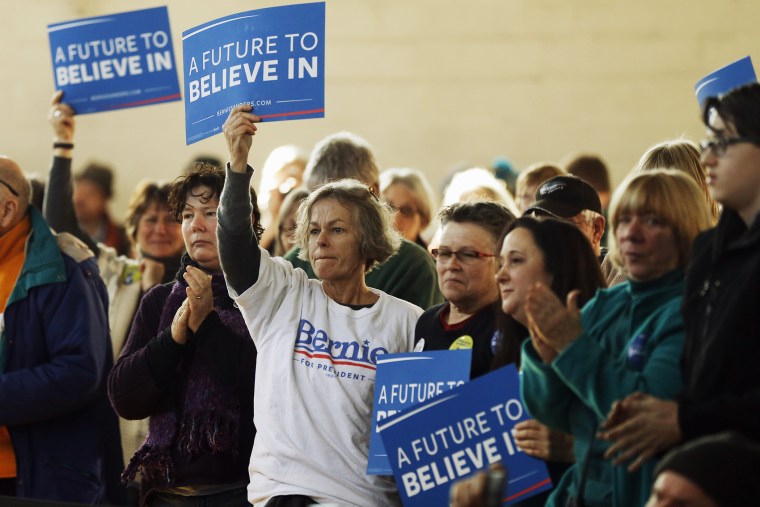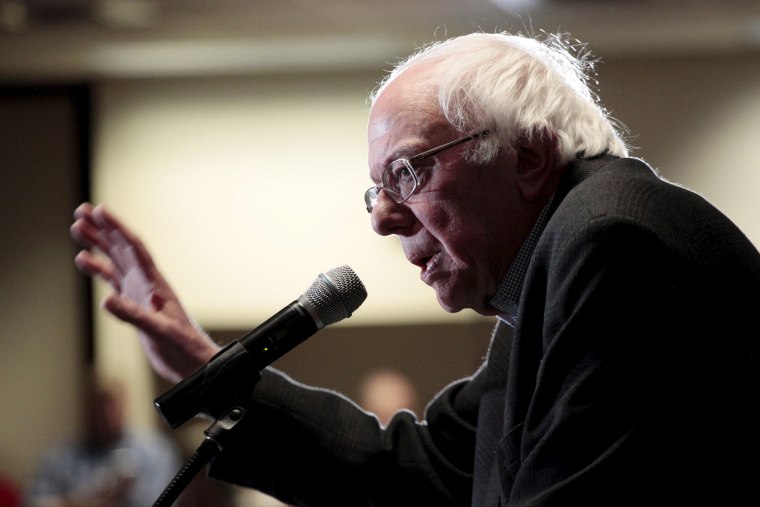Bernie Sanders picked a fight with the Democratic establishment, and the establishment is striking back. As he faces the toughest onslaught of his political life over the next 11 days before the Iowa caucuses, Sanders will have to go it nearly alone.
In a pitched battle, Sanders would be hopelessly outgunned. But the Vermont senator is waging the public relations version of guerrilla warfare. Instead of taking on Hillary Clinton’s superior forces head on, Team Sanders is betting on the ability to pick his battles, use the issue terrain to his advantage, and turn the Clinton machine’s size and strength against her.
It’s an unorthodox strategy that leaves Sanders often on defense, letting Clinton and her expansive communications infrastructure start new fights every day that could win over undecided voters. But it’s likely his best option given her superior resources, and it can help fire up his base. The more he's attacked, the more it reinforces to supporters his narrative that he’s an outsider whom the establishment views as a threat.
“We’ve expected that this is the way they would react, by lashing out left and right, and we’re ready for it,” said Communications Director Michael Briggs. “We don’t think they’re doing themselves any good, but don’t tell themselves that.”
RELATED: Hillary Clinton steps up attacks on Sanders in Iowa
On paper, it’s not even a fair fight. On Clinton’s team in the battle for hearts and minds are the majority of Democratic Party power brokers: more than 100 members of Congress; nearly 40 senators; a former president; nearly all of the powerful party-aligned interest groups and labor unions; and a large swaths of the party’s donors, operatives and policy experts.
On his side, Sanders has a rapper, a former Ohio state senator, an inflammatory academic, a couple of congressmen and a handful of liberal grassroots groups.
He does have some powerful other assets, including plenty of money, which he has now used to outspend Clinton on TV advertising. He has a massive army of committed grassroots supporters, eager to convert friends and family and evangelize on social media. And he has incredibly high approval rating among Democrats -- 91 percent in New Hampshire and 89 percent in Iowa, according to a recent CNN and Des Moines Register poll, respectively.

His popularity, his aides believe, makes Clinton's attacks risk backfiring by turning off voters or caucus-goers.
But Sanders is sorely lacking Democratic validators, who can defend him when attacked and vouch for him to a party he only recently joined formally. While Barack Obama ran an insurgent campaign in 2008, he at least had some powerful inside players to back him up. On many days, the only people defending Sanders in print or on the airwaves are people on his payroll or the candidate himself.
That’s OK, his aides say, since they believe Sanders is his own best messenger and he can fend for himself. And they want to be judicious in which battles they pick, always trying to steer the debate back to the friendlier terrain of Wall Street, climate change and campaign finance, and away from issues that favor Clinton.
“We just can't get sucked into this universe that they want to pull us into of nasty negative exchanges,” said top Sanders strategist Tad Devine. “One of the things you want to do when your opponent is on the attack is not let them dictate the terms of engagement.”
Devine pointed to the example of Sanders’ heated 2006 Senate campaign, when one of the wealthiest men in Vermont ran against Sanders with a sharply negative campaign, including one ad accusing Sanders of voting to protect child molesters. Senate Democratic leaders advised Sanders to respond in kind with tough hits, Devine said, but instead he took an above-the-fray approach with a response ad saying, “I can’t match [my opponent’s] money ad for ad, but I’ll let the truth speak for itself.”
But of course, a presidential race is not a Vermont Senate campaign, and the Clinton campaign is unlikely to level a charge as ham-fisted and repellent as accusing Sanders of defending child molesters.
Still, he has benefited by some overreach from the Clinton campaign, like her initial attack on his health care plan that some liberals took to task. And Sanders had some success altering the frame of a debate in his favor. Most notably, when the Clinton campaign and the Democratic National Committee called out Sanders after his staffers improperly accessed Clinton campaign data, Sanders’ campaign made it a fight about the DNC unfairly targeting him.
But that kind of jiujitsu won't work for every attack. For instance, Sanders still doesn’t have a satisfying answer for his record on guns, saying in this week’s debate that Clinton was mischaracterizing his record even though fact checkers say she was not.
And it’s no longer just Clinton’s campaign taking shots at Sanders. This week alone, gun control groups, women’s groups, Democratic foreign policy hands and some moderate elected Democrats all took aim at Sanders. For instance, Planned Parenthood is preparing spend $100,000 on ads for Clinton in Iowa in the final days of the campaign.
When the flak is coming from groups like these, Sanders' fallback anti-establishment message can backfire. It did when he told MSNBC’s Rachel Maddow that Planned Parenthood and the Human Rights Campaign are part of the “establishment” that he’s fighting against. He walked that back Thursday night, saying the groups are not part of the establishment – even after his campaign aides had stood by the claim after he made it.
RELATED: Sanders clarifies 'establishment' remarks amid Clinton attacks
And Clinton's campaign is suggesting that how Sanders responds to their attacks should help inform voters how he would perform against Republican attacks. “We raised a few polite concerns about their health care plan, and it sent them into a tailspin. Just imagine what Republicans would do them,” Clinton press secretary Brian Fallon told MSNBC’s Chuck Todd Wednesday.
Mo Elleithee, a longtime Democratic strategist who now runs the Institute of Politics at Georgetown University, said Clinton’s campaign is raising a fair question. “One of the many purposes of a primary campaign is to -- depending on your perspective -- help either prepare or weed out folks for the general election,” he said. “The hardest hits in the primary are never even close to what your general opponent is going to throw at you.”
Elleithee said Sanders is smart to use incoming fire to mobilize his supporters, who tend to be so loyal that no attack will dissuade them. But his approach might be less well-suited to convincing undecided voters, since it puts Sanders at odd with politicians and liberal groups people might like.
Still, Elleithee added, Sanders’ biggest challenge in Iowa and New Hampshire is likely getting his own supporters to the caucuses and polls, so anything to get them out will help.
